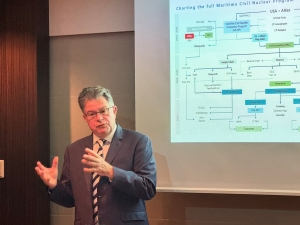


(Posted on 27/06/25)
The IMO has formally agreed to start the revision of outdated regulations for nuclear-powered ships.
The 110th session of the IMO’s Maritime Safety Committee heard proposals from several Member States and NGOs calling for a revision of the Code of Safety for Nuclear Merchant Ships (Resolution A.491) and relevant parts of the SOLAS Convention.
A working group at MSC 110 prepared instructions for relevant sub-committees to initiate the revision. This Thursday (June 26), MSC 110 assigned this task to the Sub-Committee on Ship Design and Construction (SDC), requesting SDC to start this work at the next session if
possible. The next session of SDC is scheduled for January 2026.
A key part of the instructions for SDC when updating the Code of Safety for Nuclear Merchant Ships (Resolution A.491(XII)) is to ensure it is not limited to designs of Pressurized Water Reactors (PWRs) with direct steam cycle propulsion systems but adequately address recent advances in new nuclear technologies and the All-Electric-Ship concept.
During a presentation by the World Nuclear Transport Institute (WNTI) to MSC 110, just after IMO Member States had agreed that revision of the Nuclear Code should go ahead, Mikal Bøe, CEO of CORE POWER, thanked the IMO delegates for their support and welcomed closer links between the global maritime regulator and the International Atomic Energy Agency (IAEA).
CORE POWER is the leading developer in the OECD of both advanced nuclear technologies and shipyard construction designs for maritime applications.
“This means that we can move forward to create the international framework that governs the safety and security of civilian nuclear shipping,” said Bøe.
Later this year, the IAEA will formally launch the Atomic Technology Licensed for Application at Sea (ATLAS) project, which aims to facilitate the regulatory frameworks needed to deploy needed to deploy nuclear propulsion and floating nuclear power plants.
Through its LIBERTY programme, an end-to-end system for maritime civil nuclear applications, CORE POWER are building the first fast-spectrum molten salt reactor, which is the ideal advanced reactor for civilian use at sea.
Using common engineering standards to deliver fully modular nuclear energy systems from shipyard manufacturing, CORE POWER will provide floating nuclear power plants to heavy industry and nuclear powered ships to critical value chains for industrial components, durable consumer goods, and commodities.
Headquartered in London with offices in Washington and Tokyo, CORE POWER’s progress in engineering, designs, and regulatory influence is backed by strategic industry shareholders from the global maritime industry and a fast-growing client base of shipyards, ship owners and operators, trading houses, banks, and energy companies.
AtoB@C Shipping, a subsidiary of ESL Shipping, has announced the successful delivery of Fleximar, the... Read more
Western Bulk, together with reputable Norwegian partners A/S J. Ludwig Mowinckels Rederi, Premium Maritime... Read more
Pacific Basin Shipping Limited, one of the world’s leading dry bulk shipping companies, has announced... Read more
Columbia Group anticipates a period of strong expansion as an increasing number of international shipowners... Read more
Norse?Ship Management has expanded its use of Smart Ship Hub’s high frequency sensor data and... Read more
As the maritime industry gears up to welcome the IMO’s STCW bullying and harassment training amendments... Read more
NORDEN has acquired the cargo activities of Taylor Maritime in Southern Africa (previously operated... Read more
Philippos Ioulianou, Managing Director of EmissionLink, has warned the IMO’s decision to delay... Read more
VIKAND has highlighted the need for cultural change in the maritime sector as reports of bullying, harassment... Read more
The maritime industry is experiencing a period of significant transformation, driven by rapidly evolving... Read more